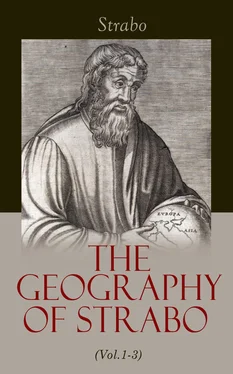5. To their simplicity and vehemence, the Gauls join much folly, arrogance, and love of ornament. They wear golden collars round their necks, and bracelets on their arms and wrists, and those who are of any dignity have garments dyed and worked with gold. This lightness of character makes them intolerable when they conquer, and throws them into consternation when worsted. In addition to their folly, they have a barbarous and absurd custom, common however with many nations of the north, of suspending the heads of their enemies from their horses’ necks on their return from battle, and when they have arrived nailing them as a spectacle to their gates. Posidonius says he witnessed this in many different places, and was at first shocked, but became familiar with it in time on account of its frequency. The heads of any illustrious persons they embalm with cedar, exhibit them to strangers, and would not sell them for their weight in gold. 1488However, the Romans put a stop to these customs, as well as to their modes of sacrifice and divination, which were quite opposite to those sanctioned by our laws. They would strike a man devoted as an offering in his back with a sword, and divine from his convulsive throes. Without the Druids they never sacrifice. It is said they have other modes of sacrificing their human victims; that they pierce some of them with arrows, and crucify others in their temples; and that they prepare a colossus of hay and wood, into which they put cattle, beasts of all kinds, and men, and then set fire to it.
6. They say that in the ocean, not far from the coast, there is a small island lying opposite to the outlet of the river Loire, inhabited by Samnite women who are Bacchantes, and conciliate and appease that god by mysteries and sacrifices. No man is permitted to land on the island; and when the women desire to have intercourse with the other sex, they cross the sea, and afterwards return again. They have a custom of once a year unroofing the whole of the temple, and roofing it again the same day before sunset, each one bringing some of the materials. If any one lets her burden fall, she is torn in pieces by the others, and her limbs carried round the temple with wild shouts, which they never cease until their rage is exhausted. [They say] it always happens that some one drops her burden, and is thus sacrificed.
But what Artemidorus tells us concerning the crows, partakes still more of fiction. He narrates that on the coast, washed by the ocean, there is a harbour named the Port of Two Crows, and that here two crows may be seen with their right wings white. Those who have any dispute come here, and each one having placed a plank for himself on a lofty eminence, sprinkles crumbs thereupon; the birds fly to these, eat up the one and scatter the other, and he whose crumbs are scattered gains the cause. This narration has decidedly too much the air of fiction. What he narrates concerning Ceres and Proserpine is more credible. He says that there is an island near Britain in which they perform sacrifices to [Pg 296]
[CAS. 199] these goddesses after the same fashion that they do in Samothrace. The following is also credible, that a tree grows in Keltica similar to a fig, which produces a fruit resembling a Corinthian capital, and which, being cut, exudes a poisonous juice which they use for poisoning their arrows. It is well known that all the Kelts are fond of disputes; and that amongst them pæderasty is not considered shameful. Ephorus extends the size of Keltica too far, including within it most of what we now designate as Iberia, as far as Gades. He states that the people are great admirers of the Greeks, and relates many particulars concerning them not applicable to their present state. This is one:—That they take great care not to become fat or big-bellied, and that if any young man exceeds the measure of a certain girdle, he is punished. 1489
Such is our account of Keltica beyond the Alps. 1490
Table of Contents
1. Britain is triangular in form; its longest side lies parallel to Keltica, in length neither exceeding nor falling short of it; for each of them extends as much as 4300 or 4400 stadia: the side of Keltica extending from the mouths of the Rhine to the northern extremities of the Pyrenees towards Aquitaine; and that of Britain, which commences at Kent, its most eastern point, opposite the mouths of the Rhine, extending to the western extremity of the island, which lies over against Aquitaine and the Pyrenees. This is the shortest line from the Pyrenees to the Rhine; the longest is said to be 5000 stadia; but it is likely that there is some convergency of the river towards the mountain from a strictly parallel position, there being an inclination of either toward the other at the extremities next the ocean.
2. There are four passages commonly used from the continent to the island, namely, from the mouths of the rivers Rhine, Seine, Loire, and Garonne; but to such as set sail from the parts about the Rhine, the passage is not exactly from its mouths, but from the Morini, 1491who border on the Menapii, 1492among whom also is situated Itium, 1493which divus Cæsar used as his naval station when about to pass over to the island: he set sail by night, and arrived the next day about the fourth hour, 1494having completed a passage of 320 stadia, and he found the corn in the fields. The greatest portion of the island is level and woody, although many tracts are hilly. It produces corn, cattle, gold, silver, and iron, which things are brought thence, and also skins, and slaves, and dogs sagacious in hunting; the Kelts use these, as well as their native dogs, for the purposes of war. The men are taller than the Kelts, with hair less yellow; they are slighter in their persons. As an instance of their height, we ourselves saw at Rome some youths who were taller than the tallest there by as much as half a foot, but their legs were bowed, and in other respects they were not symmetrical in conformation. Their manners are in part like those of the Kelts, though in part more simple and barbarous; insomuch that some of them, though possessing plenty of milk, have not skill enough to make cheese, and are totally unacquainted with horticulture and other matters of husbandry. There are several states amongst them. In their wars they make use of chariots for the most part, as do some of the Kelts. Forests are their cities; for having enclosed an ample space [Pg 298] [CAS. 200] with felled trees, they make themselves huts therein, and lodge their cattle, though not for any long continuance. Their atmosphere is more subject to rain than to snow; even in their clear days the mist continues for a considerable time, insomuch that throughout the whole day the sun is only visible for three or four hours about noon; and this must be the case also amongst the Morini, and the Menapii, and among all the neighbouring people.
3. Divus Cæsar twice passed over to the island, but quickly returned, having effected nothing of consequence, nor proceeded far into the country, as well on account of some commotions in Keltica, both among his own soldiers and among the barbarians, as because of the loss of many of his ships at the time of the full moon, when both the ebb and flow of the tides were greatly increased. 1495Nevertheless he gained two or three victories over the Britons, although he had transported thither only two legions of his army, and brought away hostages and slaves and much other booty. At the present time, however, some of the princes there have, by their embassies and solicitations, obtained the friendship of Augustus Cæsar, dedicated their offerings in the Capitol, and brought the whole island into intimate union with the Romans. They pay but moderate duties both on the imports and exports from Keltica; which are ivory bracelets and necklaces, amber, vessels of glass, and small wares; so that the island scarcely needs a garrison, for at the least it would require one legion and some cavalry to enforce tribute from them; and the total expenditure for the army would be equal to the revenue collected; for if a tribute were levied, of necessity the imposts must be diminished, and at the same time some danger would be incurred if force were to be employed.
Читать дальше












![Anne Blunt - A Pilgrimage to Nejd, the Cradle of the Arab Race. Vol. 2 [of 2]](/books/750183/anne-blunt-a-pilgrimage-to-nejd-the-cradle-of-the-thumb.webp)